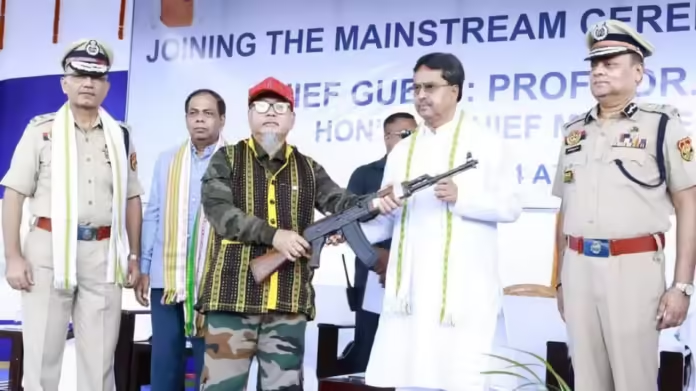In a major development for the peace process in Tripura, two of the state’s most notorious insurgent groups—the National Liberation Front of Tripura (NLFT) and the All Tripura Tiger Force (ATTF)—have decided to surrender and join the mainstream after months of negotiations. The decision was confirmed by top insurgent leader Biswa Mohan Debbarma on Tuesday, signaling a breakthrough in the state’s efforts to end decades of insurgency and violence.
The announcement follows seven months of dialogue between the Central government, the Tripura state government, and other stakeholders involved in the peace talks. Both the NLFT and the ATTF have long been involved in separatist activities aimed at establishing an independent tribal state in Tripura. Their return to the mainstream marks a monumental step towards fostering peace and reconciliation in the region.
Biswa Mohan Debbarma, the topmost leader of the insurgent groups, expressed optimism about the future. Speaking from the state capital, Agartala, he emphasized that the insurgents were ready to lay down their arms and integrate into civil society. “Our people have suffered enough,” Debbarma said. “After long years of conflict, it is time to move forward, rebuild, and work together with the government to secure a better future for Tripura’s people.”
The Tripura government, under Chief Minister Manik Saha, played a key role in facilitating the peace talks. The Chief Minister hailed the decision as a historic moment for the state. He noted that with the insurgents coming on board, Tripura is on a path to stability and growth. The state has long been plagued by violence, with insurgent activities causing widespread disruption to everyday life. “This decision will not only bring peace but also open up development opportunities in the remote areas affected by the insurgency,” said the Chief Minister.
The Central government, too, has shown its full support for the peace process. Union Home Minister Amit Shah has been actively involved in the discussions and praised the efforts of both the Tripura government and the insurgent leaders for working towards a peaceful resolution. He noted that this success aligns with the government’s larger objective of ensuring peace and security in the northeastern states. “The return of these groups to the mainstream is a victory for India’s democratic values,” Shah remarked.
The NLFT and ATTF have been active in Tripura since the 1980s, with a history of militant activities, including kidnappings, extortion, and armed attacks on security forces. Their goal was to secure an independent tribal state for the indigenous people of Tripura, but over time, their campaigns weakened due to internal divisions, lack of popular support, and increased security measures by the government. By the early 2000s, both groups were designated as terrorist organizations, and the government initiated a series of efforts to bring them to the negotiating table.
Experts in conflict resolution have hailed the move as a major achievement in resolving the insurgency in Tripura. Professor Sandeep Das, a political analyst and expert on northeastern India’s insurgencies, noted that the decision could set a positive precedent for other insurgent movements in the region. “This shows that through dialogue and negotiation, even the most entrenched insurgencies can be resolved. It opens a door for peace in the region.”
The government has promised a rehabilitation package for the insurgents who lay down their arms, including housing, education, and employment opportunities to help them reintegrate into society. The NLFT and ATTF members will also undergo vocational training to aid in their transition into civilian life. This rehabilitation process is expected to boost economic development in the tribal areas, where insurgent activities have stalled progress for years.
While the peace accord is being hailed as a success, both the state and central governments remain cautious. Security forces have been placed on high alert to ensure that no rogue factions within the insurgent groups disrupt the peace process. Authorities are working closely with local tribal leaders to ensure that the surrendered militants are smoothly reintegrated into their communities.
As Tripura prepares for a new chapter, the hope is that this agreement will bring long-lasting peace and development to the state. Both the government and former insurgent leaders agree that only by working together can the people of Tripura overcome the challenges they have faced for so long.


